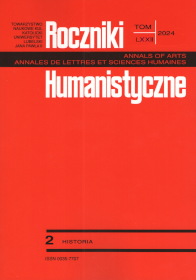KU „POLITYCE DWUTOROWOŚCI”. WŁADZE II RP NA UCHODŹSTWIE
A ANTYKOMUNISTYCZNE PODZIEMIE W „KRAJU”
TOWARDS A “POLICY OF DUALITY”:
THE GOVERNMENT OF INTERWAR POLAND IN EXILE
AND THE ANTI-COMMUNIST UNDERGROUND IN THE “COUNTRY”
Author(s): Rafał Wnuk, Sławomir PoleszakSubject(s): Political history, WW II and following years (1940 - 1949)
Published by: Towarzystwo Naukowe KUL & Katolicki Uniwersytet Lubelski Jana Pawła II
Keywords: government in exile; anti-communist underground; unloading of forests; Berg affair; “Freedom and Independence” Association;
Summary/Abstract: The objective of this article is to find out about the attitude of the Polish authorities in exile to the underground operating in the homeland. “Polish” London had been working on the plan of an anti-communist underground organisation since 1943. It was to start operating after the Red Army occupied Poland. It was designed to engage in political, intelligence and propaganda activities. After the dissolution of the Home Army, the government-in-exile sought to disband the partisan units and stop the armed struggle. Despite the changing situation, the emigration authorities expected that a division of roles between a “passive” country and “active” emigration would be best from their point of view. Such a state of affairs was described as a “policy of duality”. In the autumn of 1945, Polish military and political leaders in London concluded that there was no chance of a third world war, and therefore armed resistance and intelligence activities should be abandoned. In many cases, the thinking of the underground leaders in the homeland were the same, but it was, however, the “country” that wanted to make its own decisions. In late 1946 and early 1947, the government circles recognised that any resistance was impossible in a Poland ruled by communists and that any attempts to organise it would lead to mass repressions and unnecessary sacrifice. Therefore, the authorities in exile adopted the rule that they could not support any attempts to encourage conspiracy in Poland. This dogma was valid until the 1970s.
Journal: Roczniki Humanistyczne
- Issue Year: 72/2024
- Issue No: 2
- Page Range: 101-118
- Page Count: 18
- Language: Polish

